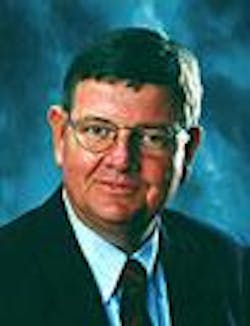Incoming IOGCC chairman will focus on technology
The Interstate Oil and Gas Compact Commission’s incoming chairman plans to emphasize technology as a way to balance the nation’s energy needs and environmental concerns.
“A governor can’t get in a position where energy trumps environment or environment trumps energy. I support development of the Jonah field, but oppose drilling in the Bridger-Teton. You don’t need to drill every place. Where you can, you should do it properly,” said Wyoming Gov. Dave Freudenthal, who will succeed Alaska Gov. Frank H. Murkowski as IOGCC chairman in September.
Congress is moving ahead with comprehensive energy legislation, the two governors noted at a press briefing and teleconference May 16 during the IOGCC’s Mid-Year Issues Summit in Anchorage.
“An organization like IOGCC is a logical place to begin implementing policies, and I expect technology to play an increasingly important role,” Freudenthal said.
Technology helps
He noted that technology has helped the oil and gas industry produce more energy in the Rocky Mountains, where different individuals or entities often own surface acreage and hold subsurface mineral rights on the same land.
“Many of the hurdles that have been placed in developing energy resources have less to do with what’s underground than with surface air and water-quality issues and ‘not in my backyard’ issues,” said Freudenthal, a Democrat.
Nevertheless, technology can allow subsurface energy to be developed in ways that are compatible with surface environmental needs, he continued. He cited Jonah field in southwestern Wyoming, where a fracturing process allowed gas to be produced from tight sands years after its initial discovery.
“It also raised some air and water quality issues. Fortunately, the high price of gas has allowed us to find ways to move the resource out without having to use trucks,” Freudenthal said.
Murkowski said that one of his goals as IOGCC chairman has been to have the organization use its influence to get national energy legislation passed. “There has been significant progress, although there is a delay in the Senate. I hope that will be cleared up,” he said.
“Clearly, the battle isn’t over,” the Alaska Republican continued. “We continue to fight for what this country needs, which is a comprehensive energy policy. It’s easier said than done. Everyone agrees that we need an energy policy, but it’s hard to get agreement on what it has to contain.”
Special interests
Freudenthal said he has “reservations” about some parts of the bill but “strongly supports” others.
“We continue to struggle with the absence of a clear and defined policy for electric transmission,” he said. “We move gas well in the Lower 48 states. Unfortunately, as each of these bills goes through, it turns into a kind of Christmas tree with an ornament here and an ornament there for special interests.”
Energy-producing states can do several things on their own, he added. “When I came into office, we activated the Wyoming Natural Gas Pipeline Authority,” Freudenthal said. The authority does not own pipelines or issue bonds tied to Wyoming but acts as a clearinghouse for information on its gas resources.
“In one case, a group was talking about building a 30-in. pipeline,” Freudenthal said. “By the time we got through meeting with them, they had decided to build a 36-in. system.”
He said, “The idea is to meet with companies and provide them information that makes them comfortable with building take-away capacity. We also try to make sure that the US Federal Energy Regualtory and environmental permitting move in a timely fashion.”
Freudenthal said Wyoming produces 2 bcfd of gas. With increased pipeline capacity, “We could get to 4 bcfd and sustain it for years.”
Wyoming has imposed significant air quality monitoring requirements on its gas development, according to Freudenthal. “A number of companies have voluntarily introduced programs. Others have not been so voluntary. For example, many of them are removing liquids now by pipeline instead of truck,” he said.
“We need to have a national energy policy, but I’m not comfortable with all the environmental exclusions. Still, the industry has a legitimate complaint that it faces delays. My experience with energy companies is that if they have the information, they can make a decision. Particularly with [Bureau of Land Management] and [US Forest Service] offsets, things can get so mired down that they don’t know what to do,” Freudenthal said. ✦

